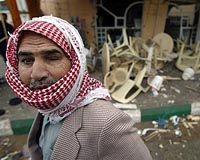 |
Ramadi, Iraq (AFP) Dec 30, 2009 Blasts in central and western Iraq killed 30 people and wounded the Anbar provincial governor on Wednesday, the latest in a series of attacks against government targets in recent months. The worst violence struck the western city of Ramadi, where 23 people were killed and 30 were wounded in co-ordinated bombings, blamed on Al-Qaeda amid collusion from the security forces, at the governor's offices in the centre of Anbar's provincial capital. Governor Qassim Mohammed Abid was among the wounded, while senior security officials were also killed and injured. Around 20 cars were destroyed in the blasts. The first attack struck near a security checkpoint at a junction leading to the governorate offices in central Ramadi at around 9:30 am (0630 GMT). About 30 minutes later, Abid and senior provincial security officials, who were in the offices, went outside to check on the situation. "A suicide bomber wearing an army uniform ran towards the governor," police Captain Ahmed Mohammed al-Dulaimi told AFP. "Some security people held him back, and he detonated himself." The attack killed the compound's security chief Colonel Mahmud al-Fehdawi, as well as wounding Abid and Anbar deputy police chief Colonel Abbas Mohammed al-Dulaimi. Anbar Deputy Governor Hekmat Khalaf Zaidan said Abid had been flown to Baghdad for treatment, and added that the governor was in "mostly stable" condition. He blamed Al-Qaeda and the security forces for the attack, telling AFP: "I am astonished by the weakness of the security forces, which have been infiltrated. "Those who carried out this terrorist attack were the intruders and extremists," he added, referring to Al-Qaeda. "Those who want bad things for this country, collaborating with the infiltrated security forces." The US military declined to confirm reports by Ramadi General Hospital that American troops took the provincial governor to a US-run hospital for treatment, when contacted by AFP. No vehicles were allowed to enter or leave Ramadi in the aftermath of the bombings. US Ambassador Christopher Hill meanwhile said he "strongly condemns" the bombings, adding in a statement that "those responsible for these attacks seek to create anarchy and prevent Iraqis from building a peaceful and prosperous society." Wednesday's attacks were the latest coordinated bombings to hit government targets in Iraq in recent months, after similar blasts struck Baghdad in August, October and December, killing around 400 people. The Baghdad attacks, which also wounded around 1,500 people, sparked public anger and spurred parliament to call in Prime Minister Nuri al-Maliki for questioning. Maliki has built his reputation on bringing security to Iraq, which was nearly engulfed by sectarian bloodshed in 2006 and 2007, and is aiming to retain his post in parliamentary elections on March 7. Iraq's National Security Advisor Safa Hussein warned in an interview with AFP earlier this week that Al-Qaeda is a threat in the run-up to the vote although it is a far smaller force than at its peak three years ago. "Their intention continues in this direction," he said when asked if he expected further waves of massive coordinated bombings. "I think during the election period, it will continue this way." Wednesday's coordinated attacks also mirrored bombings in Ramadi on October 11, when 19 people were killed and more than 80 wounded. The city west of Baghdad was a key insurgent base in the aftermath of the US-led invasion of 2003. But since 2006, local Sunni tribes have sided with the US military. Daily violence has dropped dramatically as Al-Qaeda fighters have been ejected from the region. Also on Wednesday, seven people were killed and 20 others were wounded, including a senior police officer, when an explosion struck a Shiite procession outside the central Iraqi city of Baquba. Among the wounded from the blast in the town of Khales, 65 kilometres (40 miles) northeast of the capital, was the town's police chief Colonel Shaker al-Zuhali, Diyala provincial Deputy Governor Sadiq al-Mussawi said. Worshippers were taking part in Ashura commemoration ceremonies, which continue for 40 days after the climax of Ashura, which this year fell on December 27. Although attacks have dropped markedly across Iraq compared to last year, violence remains high by international standards.
Share This Article With Planet Earth
Related Links Iraq: The first technology war of the 21st century
 Attack hits Shiites amid Ashura commemorations
Attack hits Shiites amid Ashura commemorationsKarbala, Iraq (AFP) Dec 27, 2009 Violence struck Shiite worshippers in north Iraq Sunday, while hundreds of thousands of pilgrims marked the climax of Ashura commemorations in the holy shrine city of Karbala. The attack on worshippers near Kirkuk was the latest in a spate of violence targeting Shiites in recent days, prompting security forces to beef up their presence in Karbala in central Iraq, the main focus of the Ashura ... read more |
|
| The content herein, unless otherwise known to be public domain, are Copyright 1995-2009 - SpaceDaily. AFP and UPI Wire Stories are copyright Agence France-Presse and United Press International. ESA Portal Reports are copyright European Space Agency. All NASA sourced material is public domain. Additional copyrights may apply in whole or part to other bona fide parties. Advertising does not imply endorsement,agreement or approval of any opinions, statements or information provided by SpaceDaily on any Web page published or hosted by SpaceDaily. Privacy Statement |